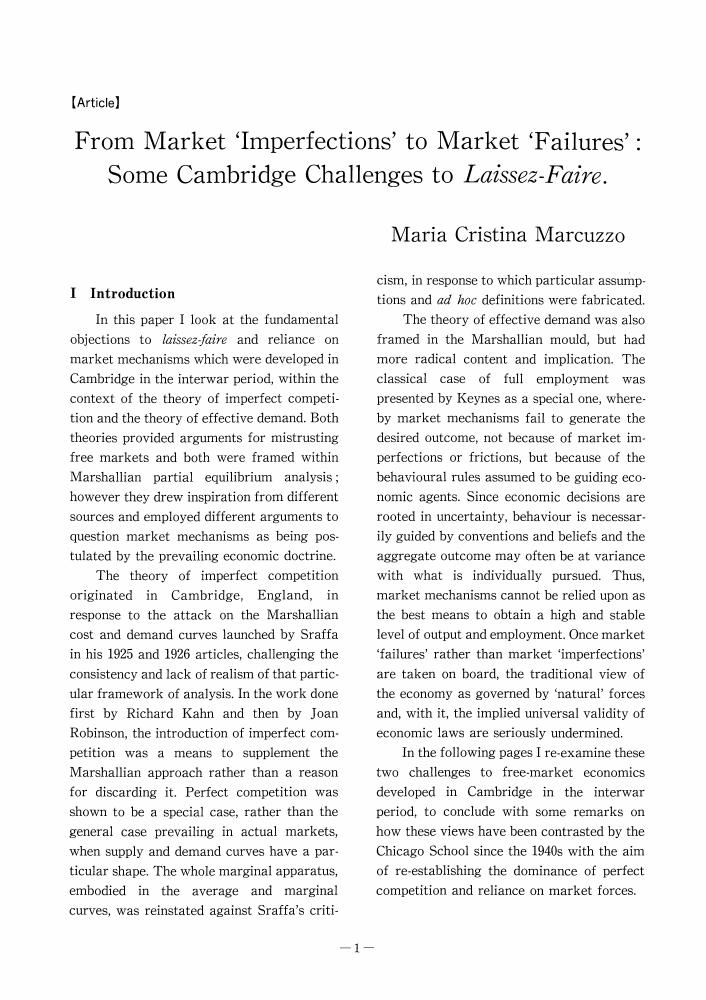- 著者
- Maria Cristina Marcuzzo
- 出版者
- The Keynes Society Japan
- 雑誌
- The Review of Keynesian Studies (ISSN:24356581)
- 巻号頁・発行日
- vol.2, pp.1-21, 2020 (Released:2021-04-24)
- 参考文献数
- 30
Over twenty-five years have been wasted praising the efficiency of free markets and running econometric tests to prove that economic policies are either ineffectual or even irrelevant, reflecting an academic scene still dominated by the macroeconomics of anti- or pre-Keynesian inspiration that took hold between the 1970s and 1980s. Increasingly sophisticated models were developed to support the argument that government intervention to stabilize the economy was not only unnecessary but actually harmful. The idea of the centrality of changes in aggregate current income (both with positive and negative signs) and its distribution in fuelling or dampening economic growth were forgotten. It is time that we brought Keynes’s ideas back.
1 0 0 0 OA Following in Shionoya's Footsteps:
- 著者
- Maria Cristina Marcuzzo
- 出版者
- The Japanease Society for the History of Economic Thought
- 雑誌
- 経済学史研究 (ISSN:18803164)
- 巻号頁・発行日
- vol.59, no.2, pp.168-180, 2018 (Released:2019-09-02)
- 被引用文献数
- 1
I Preface The late 1980s and early 1990s saw an upsurge of interest in Keynesʼs philo-sophical thinking, possibly favoured by the availability of the full set of the Col-lected Works, the reunion of all his papers at Kingʼs (the catalogue was com-pleted in 1993) and soon after the microfilming of all his entire papers (Cox 1995). Over the last 30 years or so a large literature has developed on the subject, which has branched out in various directions. Two main concerns can be found in this literature: (a) the question of the continuity of Keynesʼs views and ap-proach, since the early philosophical essays, through the Treatise on Probability to the General Theory; (b) how Keynesʼs economics is intertwined with his ethics and epistemology. In this paper I am focusing on a narrower topic (perfectionism and conse-quentialism in Keynesʼs ethics and political philosophy) following in the foot-steps of Yuichi Shionoya, whose contribution on the subject I revisited on the occasion of a commemoration held at the ESHET Conference in Paris, in May 2016. While much has been said in the literature on the non-consequentialist po-sition held by Keynes in ethics, less has been said on his being consequentialist in politics. Following in Shionoyaʼs footsteps, I would like to pursue the matter further, in particular on the implication for Keynesʼs economics.
1 0 0 0 OA From Market ‘Imperfections’ to Market ‘Failures’: Some Cambridge Challenges to Laissez-Faire
- 著者
- Maria Cristina Marcuzzo
- 出版者
- The Japanese Society for the History of Economic Thought
- 雑誌
- 経済学史学会年報 (ISSN:04534786)
- 巻号頁・発行日
- vol.45, no.45, pp.1-10, 2004 (Released:2010-08-05)
- 参考文献数
- 40
